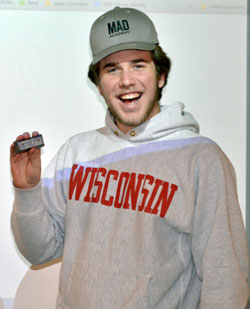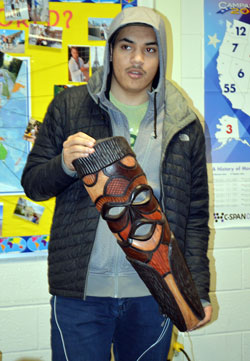What constitutes a life well lived? And who decides whose lives get to be shared as examples of that?
That’s what East Grand Rapids High School teacher Tad VandenBrink wanted his U.S. history students to consider. Over about a four-week period, some 90 students this year came up with their own definition by researching people not found in their textbooks.
The premise of the project, VandenBrink said, was to get his students “to think about who determines the people we study in this class. There’s a lot of people in history who, based on their accomplishments, you could argue deserve to be in textbooks.”
For junior Xanthe Vitaz, Josephine St. Pierre Ruffin fit the bill. She was an African American born in Boston in 1842 whom Xanthe found via an online search that began with “women’s rights.” Ruffin was an activist, journalist and published the first African-American women’s magazine.
Characteristics of Ruffin’s life well lived, Xanthe said: “To dedicate yourself to the freedom and equality of others and act on that by helping yourself and those around you, striving to make a difference, and not waiting for change to happen — creating change.”
Sophomore Jack Douse thinks Robert Smalls led a life well lived. The African American who was born into slavery in 1839 became a naval Union hero in the Civil War and later, a U.S. congressman.
Smalls’ characteristics of life well lived, Jack said, are that “he took every chance he had to help others, made a lasting difference in society and persevered through difficult times.”

How It Works
This was the second year VandenBrink led the Life Well Lived project in his U.S. history classes. He previously led it for two years in his world history class.
Students choose a topic they are curious about. VandenBrink encourages them to start with sources not usually encouraged for school research: Wikipedia and Google.
To find a person to research, he tells them to “just start clicking around and look for names to pop up.” What they are looking for, he said, are names that are not in the class textbook or any of VandenBrink’s review guides.
“That means these are people who, ultimately, we are not going to talk about it in class,” he said. “But they are also people they would be interested in learning more about because they connect to the topic they are interested in.”
Then, like a football draft, there’s a Life Well Lived draft; students choose a few people they want to study, each name goes into the draft once, and students choose one name each.

Lives Overlooked but Worth Studying
Formulating their definition of a life well lived comes as students research their chosen figure and realize the traits and accomplishments that drew them to learn more. Then, they consider how that lesser-known person’s positive traits align with more well-known figures.
As part of the research project, students submit papers on their chosen person. A classmate provides proofreading and feedback on whether their premise is supported.
As for starting with Wikipedia and Google: “The internet is a resource for these students,” VandenBrink said. “My job is to get them to think differently about using it by thinking about how their positive traits contribute to them being a significant person in history who I can argue lived a life that is worth studying in history class.”
He further explained: “If you’ve got someone like Daniel Boone, who isn’t in the textbook, one definition of a life well lived would be someone who is adventurous and willing to take risks. So as you talk about that definition of a life well lived, you use what Boone did — blazing a trail to Kentucky — to support that definition. Or bring in Teddy Roosevelt, who also was very adventurous.
“This is the synthesis of taking a lesser known figure and connecting them in an indirect way to see the connection between figures in history.”











